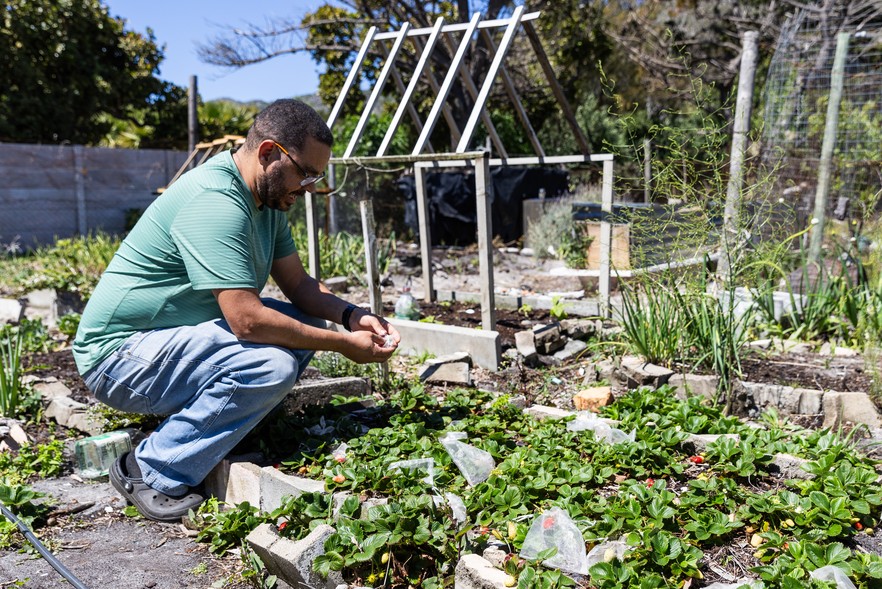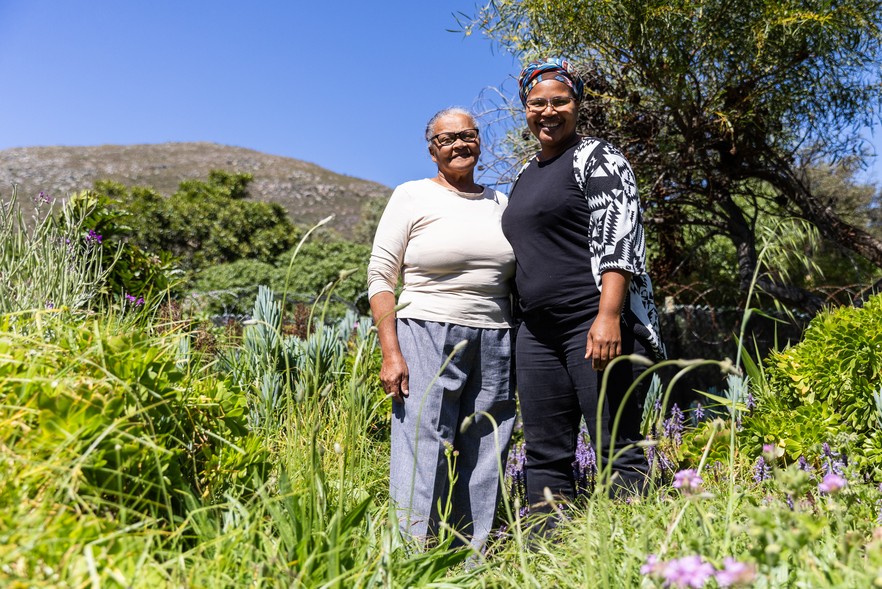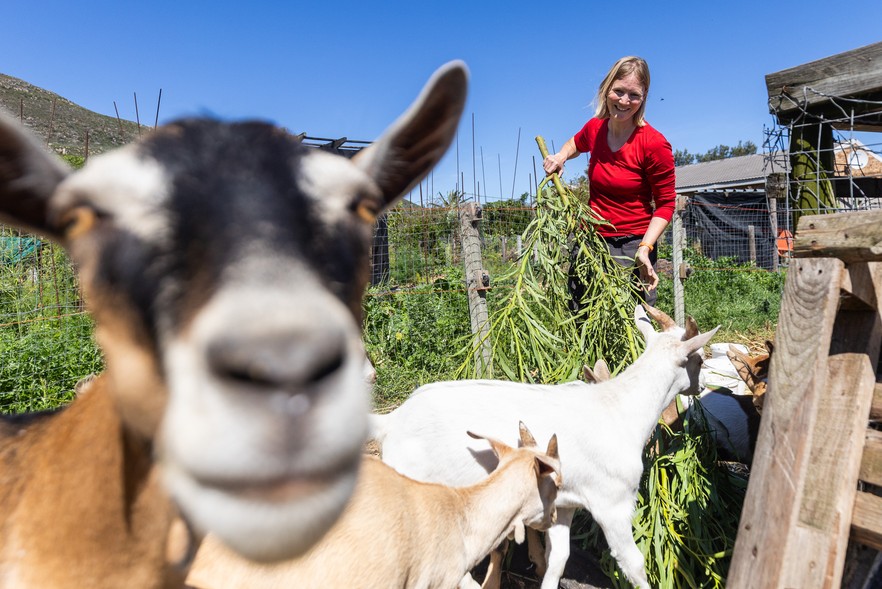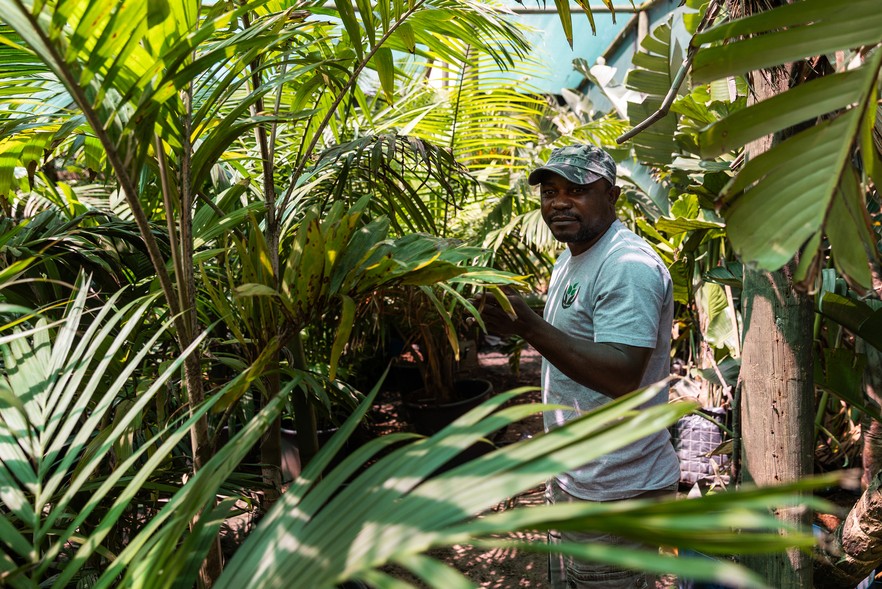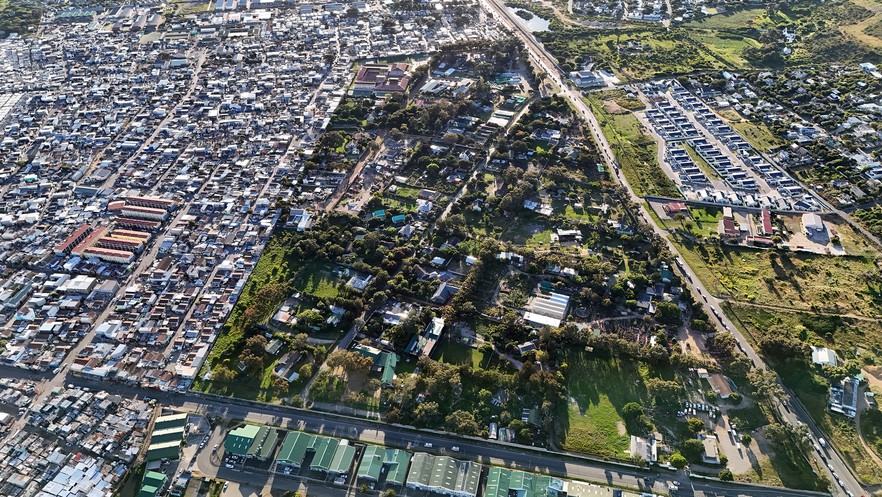Dispute over City of Cape Town’s plan for Noordhoek valley
Plan to relocate Masiphumelele families sparks concerns among residents of smallholdings
Edwin Fransman picks strawberries from the garden at the small school he runs in the Lochiel smallholdings. Photos: Ashraf Hendricks
- Residents and businesses on smallholdings in the Noordhoek valley are objecting to a City of Cape Town plan to buy their properties to build temporary housing for Masiphumelele families.
- About 1,500 Masiphumelele families have to be moved from a wetlands area.
- Lochiel Smallholdings Association says other vacant land options were not chosen by the City because of “anticipated opposition” from wealthier residents.
- The City says no acquisitions have been made and no decision will be made without consulting affected communities.
Businesses and families living on the Lochiel smallholdings bordering Masiphumelele township, between Noordhoek and Kommetjie, are pushing back against the City of Cape Town’s development plan for the area.
The City’s Local Spatial Development Framework outlines how it will address the rising housing needs in Masiphumelele. This includes a plan to relocate families from informal homes in wetland areas to a temporary relocation area (TRA), in order to develop and extend Houmoed Avenue to provide better access to Masiphumelele. About 1,400 households are to be moved.
The City lists various sites as options for the relocation of the Masiphumelele families, including City-owned land adjacent to Masiphumelele, several sites in Ocean View, a site in Fish Hoek, and City-owned land in Noordhoek, as well as the smallholdings. The Lochiel smallholdings are identified as the preferred option, because the land is close to Masiphumelele, and is “underutilised”.
The City plans to buy about 70% of the smallholdings area.
Residents and business owners in the smallholdings have objected to this. They fear once the City starts buying sites, their properties will lose value, and they will eventually be forced to sell.
They deny that the land is underused, saying their businesses create jobs for hundreds of people, most of whom live in Masiphumelele.
In response to the City’s draft plan, over 50 property owners formed a non-profit organisation, the Lochiel Smallholdings Heritage, Business and Agricultural Association, to oppose the development plan. They’ve launched a petition with over 4,000 signatures.
“Residents are not required to sell if they do not want to sell,” the City’s Deputy Mayor and Mayoral Committee Member for Spatial Planning and Environment Eddie Andrews told GroundUp. Future acquisitions would be on a “willing buyer and willing seller basis”, he said.
Andrews noted that there was a limited number of “unconstrained parcels of developable vacant land” in the surrounding area for the growth of Masiphumelele.
Christien Coetzee and her daughter Christelle Olyn in their garden on the smallholdings.
Christelle Olyn and her mother Christien Coetzee have lived on a property in the Lochiel smallholdings since 2016, after moving from Ocean View. Their family has lived in the False Bay area for generations.
Coetzee, who is retired, says when she was growing up most of her family members worked on farms in the area. She worked at False Bay Hospital for 29 years and eventually saved up enough to buy a property in Lochiel smallholdings. Now she fears she may be forced to leave should the City go ahead with plans to buy the smallholdings.
“Now that I want to build something for my children and my grandkids, it makes me sad that I can’t leave behind that legacy.”
The family hopes the City will develop a vacant piece of land rather than purchase their property.
Jo Hunter-Adams and her family run a small urban farm and nursery in the smallholdings. She said in meetings with the City about its proposal in 2018, they had explained that their land wasn’t underutilised.
“Lots of things are happening here,” she said.
Other business owners in the area are also worried about having to close down.
Jo Hunter-Adams and her family run an urban farm and nursery called Heart & Soil in the smallholdings.
Kudakwashe Moses Siyapeya runs a large nursery and a greenhouse where he builds sets for the film industry. “We’ll have to close,” he said, adding that this will “affect a lot of lives”. He says he often hires dozens of people to build sets for films, commercials, weddings, and photoshoots.
Edwin Fransman runs a homeschool for about 20 children, mostly from the surrounding area. He worries that he will not be able to find a property of the same size if they have to move. “Here the children can have space, they can run around, they can be free to just be kids,” he said.
Kudakwashe Moses Siyapeya runs a nursery that provides plants for film sets.
Commenting on the City’s plan, Masiphumelele community leader Tshepo Moletsane said any decision “should consider the interest of the majority” of residents affected by the relocation.
Moletsane said the Masiphumelele families would rather be moved to a City-owned 148 hectare site in Noordhoek. But he acknowledged that the more affluent residents around this site would likely object to their relocation. There was also a piece of land managed by SANParks that the City could consider, he said.
The City’s spatial development plan includes only a portion of the Noordhoek site, which measures about 5.5 hectares. However, the City’s map viewer shows that the entire portion of the Noordhoek site measures about 148 hectares.
Moletsane rejected the City’s preferred option of the Lochiel smallholdings because Masiphumelele residents would be “squeezed” in between people already living on the land.
He said it was important that people were not moved into shacks when they were relocated. “It affects the dignity of people when you move a person from a shack to another shack,” he said.
In its objection, the Lochiel Smallholdings Heritage, Business and Agricultural Association also raised concerns that other vacant land options had not been chosen due to “anticipated opposition” from wealthier residents, and that the smallholdings had been preferred because of“economic vulnerability”.
Masiphumelele on the left and the Lochiel smallholdings on the right, with Kommetjie road on the right. Photo supplied
In its spatial plan for the Noordhoek site, the City acknowledges that the site is “likely to face strong local community opposition” and has the “potential for illegal expansion”.
The City told GroundUp that “no acquisitions have occurred yet”. Andrews said acquisition would “depend on” feasibility, “interdepartment coordination”, and engagements with owners and the community.
“Only once Council, amongst others, approves the proposals as part of the LSDF and subsequently makes budget available, can acquisition processes be initiated,” said Andrews.
The Council will also consider comments from the community. He said if other “growth options” become available, “these will be considered and there may not be a need to pursue the current proposals”.
The City said future phases will “require formal public participation and ongoing community engagement” and no decision would be made without consultation with affected communities.
Support independent journalism
Donate using Payfast

Don't miss out on the latest news
We respect your privacy, and promise we won't spam you.
Next: Official implicated in corruption appointed head of KZN social development
Previous: The real cost of Johannesburg’s water
© 2025 GroundUp. This article is licensed under a Creative Commons Attribution-NoDerivatives 4.0 International License.
You may republish this article, so long as you credit the authors and GroundUp, and do not change the text. Please include a link back to the original article.
We put an invisible pixel in the article so that we can count traffic to republishers. All analytics tools are solely on our servers. We do not give our logs to any third party. Logs are deleted after two weeks. We do not use any IP address identifying information except to count regional traffic. We are solely interested in counting hits, not tracking users. If you republish, please do not delete the invisible pixel.

